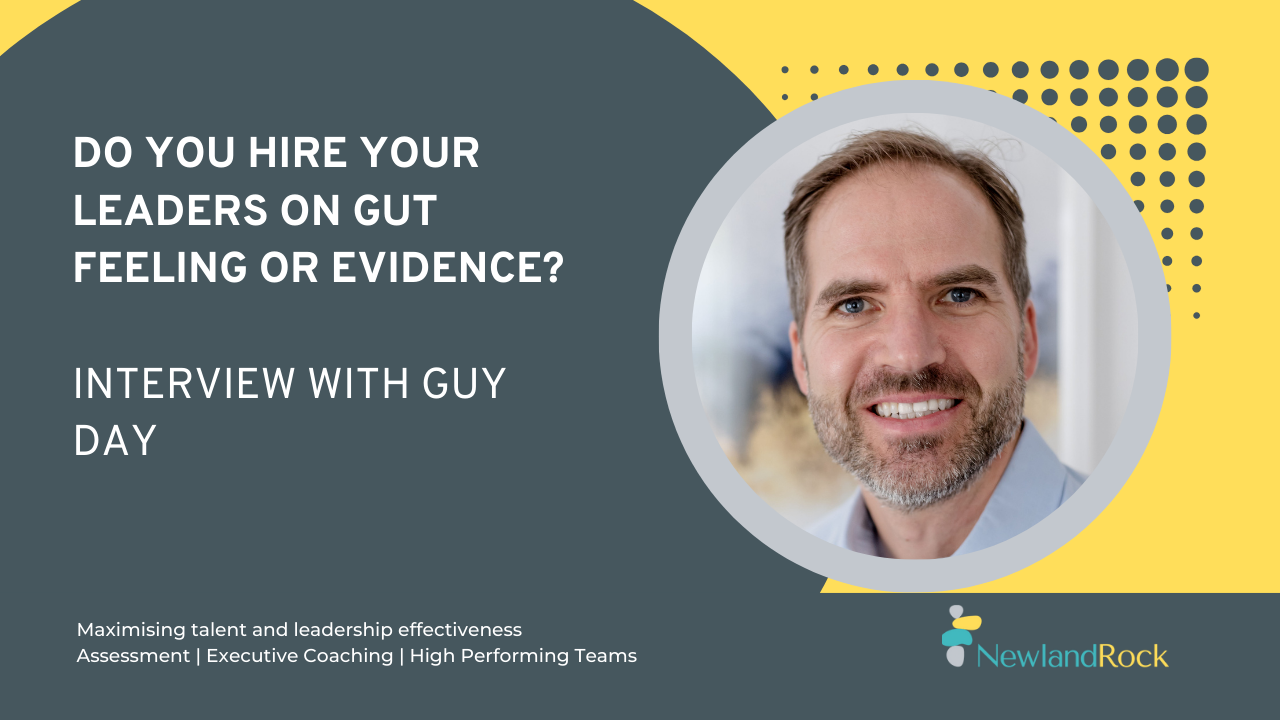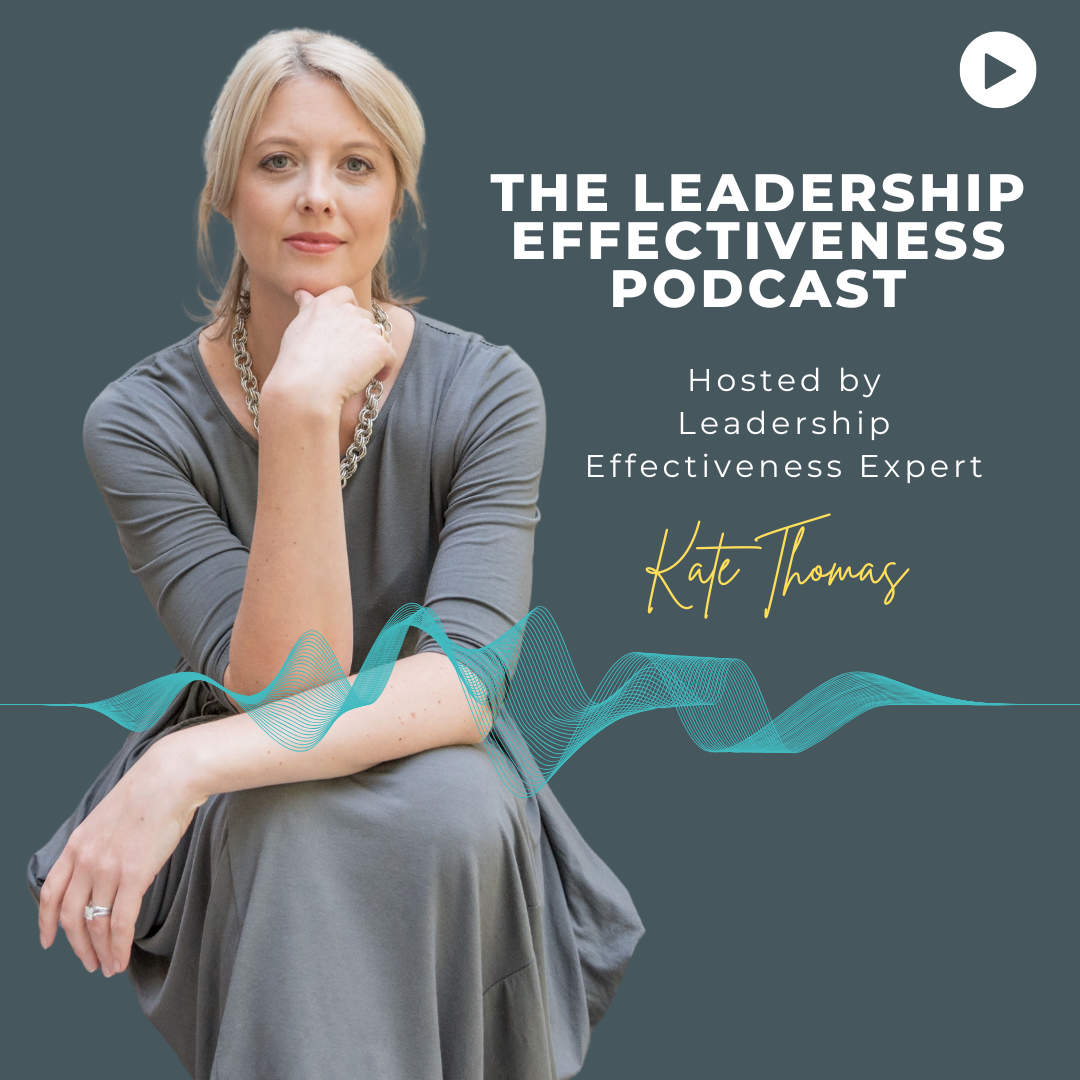Do You Hire Your Leaders on Gut Feeling or Evidence? -Interview with Guy Day
Mar 14, 2025
In this challenging time of change and uncertainty the need for strong and effective leadership in the workplace has never been more important. In this article I interview Kate Thomas from our sister company Newland Rock to discuss what key qualities she thinks companies should be looking for when recruiting for an effective leader.
As CEO of Newland Rock, Leadership Effectiveness Consultant Kate Thomas brings over 20 years of experience within the talent strategy space to our discussion. Over the last 10 years Kate has honed her experience down into partnering with large organisations to help them identify and grow their leaders to be more effective; essentially helping them to get the best out of people in their business. Kate explains her three-step approach.
“The first area I focus on is on the assessment side, getting to a deeper level of how someone is doing what they are doing, then we move into developing them and maximising their potential through executive coaching. The third area is focused on sustainability; how can that leader continue to remain effective given the challenges and tremendous responsibilities they face, especially in the current situation. That is where I help them to look into their specific mental fitness and wellbeing strategies.”
Kate is passionate about helping businesses differentiate themselves based on their talent. She believes it’s not necessarily about what you’re doing as a business it’s about how you’re doing it and that ‘how’ comes from your people. It’s about your people, your talent being with you on the journey and how you lead those people to get behind the right behaviours from a culture point of view. I asked Kate what she feels are the headline characteristics that senior digital executives struggle with, here are her key thoughts.
Control Over Decision Making:
When you are working with a digital leader, often they are the one who is in the hot seat in amongst a big element of change. Decision making rights aren’t always clear cut and this can be one of the biggest challenges in terms of how successful a business is. You can find the digital leader is caught in the middle of trying to push forward but without the level of control needed to push projects through. The challenge is helping them control that balance between wanting to get there, the speed they want to get there, whilst bringing people with them on the journey so that they get there altogether. Rather than the digital leader standing there on their own with just a few allies standing next to them.
Having An Agile Leadership Style:
The pandemic has forced the digital agenda up the board for a lot of organisations creating huge challenges in not just deciding the best way forward but also having to implement it at the same time. This increased focus and speed is forcing digital leaders and decision-making teams to be highly agile in how they make decisions at an operational level.
One of the most obvious ways organisations have had to become more agile is in remote working. The Covid induced home-working environment has forced leaders to adjust their style and show up as an individual and as human. Working remotely means leaders are having to work virtually on building relationships with their teams and recognise they need to give space for everyone to interact and have human interaction.
Being an agile leader is about two main things. How you’re thinking and then what it is that you’re doing. From a thinking place you know somebody has an agile way of working if they’re curious and inquisitive and ask a lot of questions. An agile leader will explore every possibility and consider if they haven’t done something before, why not, what is it that we could do? They are future focused, energised to break down boundaries and instil something different.
When it comes to the second part you will see an agile leader thinking broadly about who else needs to be involved, who can add perspective here so they can make sure that they are exploring everything there is to explore. There is a level of differentiating factor for people who are in that agile category. The challenge agile leaders have is in ensuring that whilst they are going full throttle in creating ideas and looking like they are moving forwards they are bringing people with them. They need to balance their leadership style with how they manage their people.
The Comfort Zone of Change
Being an effective digital leader in organisations undergoing a huge level of digital transformation requires a huge capacity for being comfortable with change. The characteristics of being an agile leader are important when change is needed to be driven forward and embedded in a business. The ability to be bring people on the journey from lots of different functions from the top down and lead the transformation is ultra-critical. As human beings we don’t like change. Some of us do, and we can get energy from it, but as a leader you must deal with the fact there is going to be a large population that are not at their comfort level with what they are changing, and that might be across senior leadership teams not just those a lower level.
Can You Work on Being a More Agile Leader?
Kate uses a variety of psychometric and behavioural science-based approaches to assess her leaders so I was keen to hear her thoughts on how candidates could work on developing those agile leadership skills. The first thing Kate would address would be to ascertain the real reason why that person wants that specific role. Sometimes when a role comes with a high level of responsibility, influence, and authority it can attract the wrong people. It can be a case of the role they are attracted to rather than the fact they have the capability and characteristics to do it.
“If someone came to me and said, ‘I really wanted that job, but the feedback was that I didn’t necessarily demonstrate the agility traits’ firstly I would be looking at why they actually wanted to be in this type of role in the first place and are they motivated by the wrong things. Then I would be looking at their mental fitness and questioning if they are operating more in survival mode. This makes us feel and act more in a task orientated way which blocks our creative brain, and we block our ability to be agile. Whereas if we rewire our brain and remove the level of pressure and stress that we’re placing on us we can, and do, actually come from an agile mindset more naturally.”
How Can You Effectively Assess a Candidate’s Leadership Attributes?
Kate talks about some of the techniques and strategies she uses to assess but explained that recruiting at a senior level involves a much more scientific approach. It’s not about having a set of core interview questions but more around an interview style and process. The key is to draw out who the person really is and back that up with behavioural science-based assessments. These assessments provide the evidence which validates that the person you’re hiring can do the job and they’ve demonstrated the characteristics as well as having the right experience. This approach gives the organisation much greater confidence that they are hiring the right person and they have a clear picture of what that person is and is not capable of, making it easier for them to close the gap on the areas that need development.
Even though this approach can take several hours, feedback from candidates has been overwhelmingly positive, with many commenting that they have found this type of interview transformational as it’s given them time to think about themselves in a way they haven’t for a long time. This interview/ executive coaching approach really helps candidates to consider what’s going on for them and make connections about why and how they do things.
Most companies hire on gut feel and think they don’t have the time or budget to take this more evidenced based approach to recruiting. However gut feeling is subjective, and it can be conflicting when there is a panel of interviewers involved assessing a candidate. If you combine the evidence-based assessment approach to narrow the field of candidates down first then gut feeling has a place in deciding who fits the culture and core values of the organisation, that approach works much better.
If you are interested in finding our more about Kate’s candidate assessment programme or her leadership effectiveness coaching, then contact Kate Thomas at Newland Rock www.newlandrock.com.
Guy Day is Founder and Director of BartonRock, an executive search firm that specialises in hiring senior executives for digitally transforming companies. For more information on recruiting your next digital leader contact Guy at Barton Rock www.bartonrock.com


